In Ituri province in the northeast of the Democratic Republic of the Congo (DRC), young people have taken a significant step towards eradicating identity stereotypes and promoting peace. Last July, hundreds of young people took part in the election of the new committee of the Provincial Youth Council in the town of Bunia. The election was organised as a recommendation from a youth dialogue session held in June 2023, supported by the mediation consortium consisting of the NGO’s Interpeace, Action pour la paix et la concorde and Pole Institute, as well as New York University, with funding from the European Union.
To the applause of the assembly, Bungamuzi Kukwabo Déogratias was elected president with 18 votes out of 37. First among the four candidates in the running, he believes that the task to have young people involved in peacebuilding is now easy following a dialogue session to bring together young people from all the region’s communities. “This dialogue was a real opportunity to bring together the perpetrators and victims of insecurity. At the same time, it was easy to identify young members of certain armed groups”, he acknowledged. For him, the impact of these meetings is already visible. “The members of the committee I’m to head after our installation in a few days’ time by the provincial governor are young people from almost every community in Ituri”, he said.
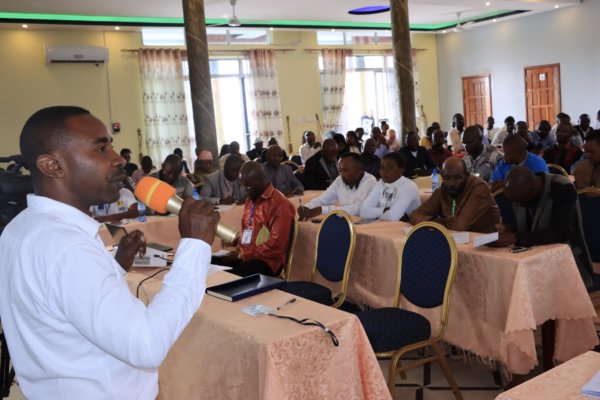
The aim was to get young people involved in the peacebuilding process in this part of the country. And it's done! They have committed themselves to changing the situation by agreeing to put an end to the leadership crisis within their provincial council. "One or two weeks ago, I went on a mission to Kasenyi on the shores of Lake Albert. I was amazed to find young people from different entities using the same means of transport to take part in an activity organised for them. It was almost impossible before these meetings to see, for example, a young person from Bahema-Boga taking a young person from Walendu Bindi on board his motorcycle", enthuses the new youth president.
At the close of the three-day meeting in Bunia, Steve Sengida, deputy director of the cabinet in charge of the economy and finance, was already clear on behalf of the governor. "We must be ashamed of our province's lagging development. The time has come to turn our backs on manipulators. The recalcitrants will only face justice or neutralization", he insisted.
For the president of the Bedu Ezekere local youth council in Djugu territory, this is the first time that young people have been specifically called upon to take part in this kind of activity. "I think peace must continue. I thank the organizers", said Lotsima Dhembu Kabose.
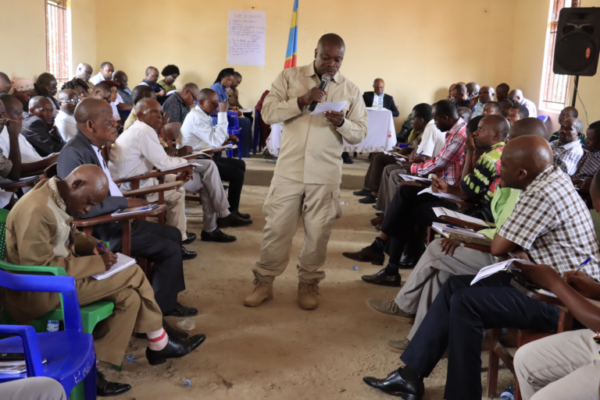

At the end of the meeting, young people from all the structures in the five territories of Ituri province signed an act of commitment, following a plan of concrete actions in the peace process. To mark their support for the peace process, their representatives even lit "candles" as a "light of peace".
"Peace is a struggle for all of us", said one of the participants. During the proceedings, the elements of cohesion between young people from different communities were discussed. The aim was to identify factors of division and cohesion, and concrete actions to be taken by these people, men and women alike.
"We, as young people, are the authors of and responsible for any problem that the province of Ituri is going through. We must first become aware of the situation, and then return to responsibility in order to disassociate ourselves from anti-values", said the president of the Mahagi territorial youth council, Unyuthfwa Nyangambe Jean Claude.
At the invitation of by Interpeace in collaboration with the provincial government, the provincial coordination of the Disarmament, Demobilization, Community Rehabilitation and Stabilisation Programme (P-DDRCS) and the Mediation Advisory Group (MAG), over 400 young people took part in the meeting. They were joined by a number of provincial deputies, members of religious denominations and other local, national and international NGOs. This activity is part of the "Support for meditation and resilience for peace in Ituri and Greater North Kivu" project.
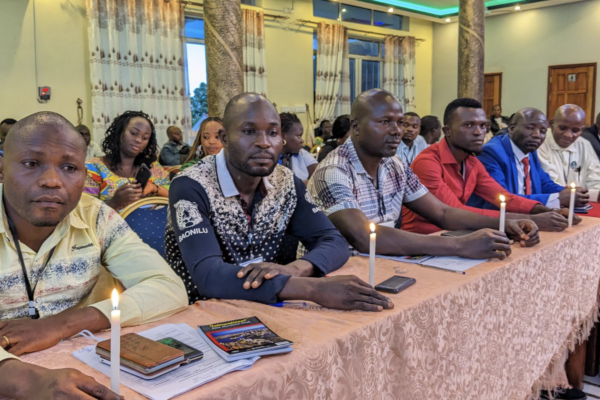

Since the late 1990s, Côte d'Ivoire's universities have been constantly troubled by episodes of violence. When it's not the students who are confronting each other, it's the tensions between them and the forces of law and order that inevitably lead to damage of university infrastructure, destruction of private property and, worse still, loss of life. Today, the victims of this violence are countless. And the impunity apparently enjoyed by the perpetrators is just as questionable as the ability of the response provided by the authorities and the various players, alternating between repression and attempts at mediation, to address the structural causes of this violence.
To gain a better understanding of the dynamics fuelling this almost uninterrupted cycle of tension and violence, for better prevention, Interpeace and its partner Indigo Côte d'Ivoire have conducted a Participatory Action Research (PAR) process on the issue. In 2021 and 2022, students, as well as teachers, administrative staff and decision-makers, were engaged in collective reflection and dialogue in three of the country's public universities: Nangui Abrogoua in Abobo-Adjamé, Alassane Ouattara in Bouaké and Félix Houphouët-Boigny in Abidjan-Cocody.
The research was supported by the United Nations Development Programme (UNDP) and the United Nations Population Fund (UNFPA), with funding from the United Nations Peacebuilding Fund. It was supported by the Ministry of Reconciliation and National Cohesion and the Ministry of Higher Education and Scientific Research (MESRS).
The first observation revealed by this research is that it would be wrong to think that violence is only due to episodic clashes between students. The causes are multiple: they stem both from internal campus dynamics, and from influences that can be attributed to actors outside and around the university. Beyond the already well-documented union rivalries, problems of academic governance, access to cultural services and power are fuelling human losses, material destruction and sexual and economic violence. Truly inclusive mediation and dialogue mechanisms are needed to prevent this situation.
A "culture of violence" is part of the collective action of university unions, which claims not to be heard if they don't resort to it. But above all, this approach leads to inequalities in access to university services, competition for resources and blockades imposed, if necessary by force, on both the administration and the members of these unions. More dialogue and democratic representation must be guaranteed. Faced with impunity and insecurity, teaching, administrative and technical staff are underperforming.
More exposed to threats, young women are sometimes forced to abandon their university studies in the face of the sexual and gender-based violence (SGBV) to which they are subjected, due to a climate of virtual impunity and difficult study conditions. Some are forced to sleep in lecture theaters and wash in university toilets, in the absence of suitable accommodation. Sexual harassment and rape are regularly observed in this university ecosystem. The perpetrators may be ordinary students or people in positions of power, such as lecturers, student movement leaders and support staff. Prevention measures, as well as reporting and victim support mechanisms, are inadequate or sometimes non-existent.
In addition to the problems associated with players directly involved in the academic environment, some political entrepreneurs also bear a share of the responsibility. By sponsoring certain university unions, they in turn obtain a mass of support from their rivals in the national political competition, with some students creating violence in the political arena. This endorsement often also protects these young people from sanctions and any form of conviction for the criminal acts they commit on university campuses, again reinforcing impunity. Another source of tension is that a trade union can sometimes be coveted by two political entrepreneurs, opening the field to a struggle for control.
In the face of these difficulties, the research recommends more mechanisms to combat impunity and more inclusive university governance based on consultation. For several years now, a number of associations have been trying to reduce university violence. But they do not address the structural causes, and are often rejected by the unions. Their role needs to be recognised, and a dialogue established between the various players.
Dr Séverin Kouamé, sociologist and Executive Director of Indigo Côte d'Ivoire, asserts that "through dialogue, sympathetic listening and conciliation, it is possible to put in place a form of governance that is inclusive of the different sensibilities that make up the academic world, and thus dry up the fertile ground on which violence thrives on our campuses".
In the three institutions where the research was carried out, more and more people among the stakeholders, whether perpetrators of violence or victims, are calling for a change of attitude. The time has come to "pacify Ivorian universities for good".

Malian women have yet to realize their full potential as agents of change in their society. Many of them are working for greater social benefits in their communities, and for improved social cohesion and peace-building. But all too often, many obstacles prevent them from doing anything about it. Among these, the weight of socio-cultural norms, lack of access to education and their absence from decision-making processes limit progress on this issue.
In response to this situation, Interpeace and its local partner Aide au Développement Durable (ADD) officially launched the European Union (EU)-funded project "Voix des femmes: amplifier l'engagement citoyen et le rôle des femmes en agents de changement au Mali" in Bamako on Thursday July 13. Until 2025, women's organisations in the north of the country, in the center and in the capital region will be supported in strengthening their organisational capacities. Dialogue with traditional chiefs and authorities will be extended. And advocacy efforts will be conducted with a number of key players to increase the role of these women in peace-building.
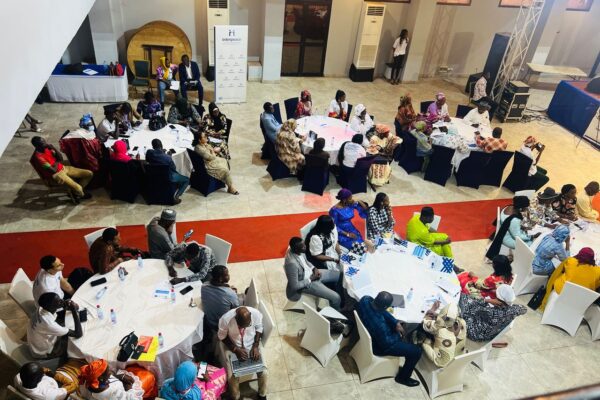
 Among the speeches made at the launch of the project, Ndeye Sow, representative of the Minister for the Promotion of Women, Children and the Family and advisor in charge of women's empowerment, noted that the project "comes at just the right time, as it responds perfectly to the concerns of the highest authorities of the transition for the emergence of a new Mali". "We can only welcome this great initiative", she added.
Among the speeches made at the launch of the project, Ndeye Sow, representative of the Minister for the Promotion of Women, Children and the Family and advisor in charge of women's empowerment, noted that the project "comes at just the right time, as it responds perfectly to the concerns of the highest authorities of the transition for the emergence of a new Mali". "We can only welcome this great initiative", she added.
Present at the ceremony, the mayor of the district of Bamako, Oumarou Togo, invited Interpeace, its partner ADD and all stakeholders to invest "to make this project an unprecedented success for the benefit of the target women's civil society organisations". The success of "Voix de femmes" will depend on "the effective involvement of all stakeholders at all levels", remarked Interpeace Regional Representative Maria Alessia Polidoro.
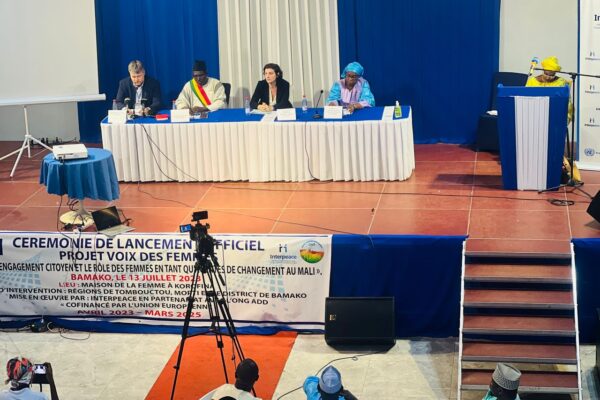
 This commitment is by no means a first for Interpeace in the country. Having been present since 2013, the organisation had already carried out an extensive assessment of Mali's peacebuilding challenges. In this participatory action research (PAR) involving over 5,000 people in eight regions of the country and in refugee camps in three neighboring states, it identified the main obstacles to progress as being the erosion of societal values, lack of access to employment for young people andproblems of governance and insecurity.
This commitment is by no means a first for Interpeace in the country. Having been present since 2013, the organisation had already carried out an extensive assessment of Mali's peacebuilding challenges. In this participatory action research (PAR) involving over 5,000 people in eight regions of the country and in refugee camps in three neighboring states, it identified the main obstacles to progress as being the erosion of societal values, lack of access to employment for young people andproblems of governance and insecurity.
Since then, several projects have been established, the most recent being "Voix de femmes". To ensure broad involvement, regional and national advisory committees will be launched to guide all initiatives and activities. The aim is always to make women's voices heard more widely in Mali.
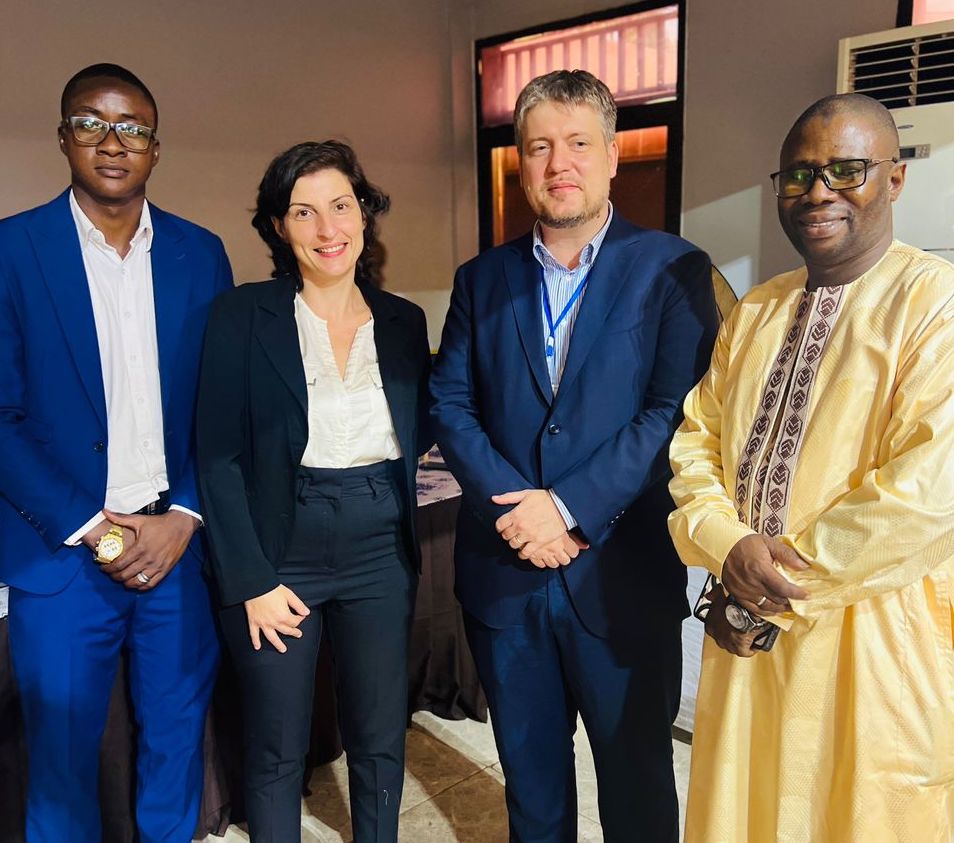
The 1994 Genocide against the Tutsi in Rwanda had significant consequences for mental health, social cohesion, and socioeconomic development. By 1996, approximately 130,000 individuals suspected of participating in the genocide had been arrested and detained. One of the major consequences of the genocide has been the severe mental health problems experienced by the survivors due to the horrendous atrocities committed against them and their loved ones. Recent studies have concluded that even genocide convicts experience various psychological distress due to the atrocities they committed, and their incarceration, making their effective reintegration into their families and communities after release quite complex.
“I was deeply traumatised due to my difficult life in prison and held on too much anger against my family because they didn’t care about me as I would have wished,” said Edi (pseudonym), a Genocide convict detained in the Bugesera correctional facility located in the Eastern Province of Rwanda.
Edi’s case is not isolated, as his colleague Alpan (pseudonym) also experienced deep depression and social isolation for over 27 years. “I felt traumatised and anxious every time I thought about what I did during the genocide and how I disappointed my family and community. I didn’t want to talk to anyone here and had lost interest in everything since I thought my life had no meaning,” narrates Alpan.
A significant number of those convicted of genocide crimes have already been released in recent years. According to Interpeace’s research studies, released prisoners are likely to cause tensions and anxiety among families of genocide survivors and the community in general, potentially leading to recidivism. Failure to ensure their effective psychological rehabilitation constitutes a major hindrance to unity and reconciliation gains 29 years after the genocide.
Since 2020, Interpeace and its local partners, Dignity in Detention Organisation, Haguruka, and Prison Fellowship Rwanda, with financial support from the European Union and the Government of Sweden, have been implementing a holistic peacebuilding programme that simultaneously addresses mental health, promotes social cohesion, and strengthens economic livelihoods, with a particular focus on the psychological rehabilitation and reintegration of prisoners.
Impact of Sociotherapy healing spaces in prisons
Interpeace, together with its local partners, created Sociotherapy healing spaces in five prisons, namely Bugesera, Nyamagabe, Musanze, Nyagatare and Ngoma to provide inmates about to be released with group-based psycho-social support services.
After a rigorous screening process to assess their level of distress and needs, detainees nearing release are allocated into groups of between 12 and 15 members each. Guided by fellow detainees who had been well-trained, they engage in healing dialogues which last for 15 weeks. Conducted in a safe space and conducive environment, these dialogues simulate mutual healing, peace of mind and cohesion.
“Sociotherapy healing spaces enabled me to realise that being in jail is not the end of my life. Before, I was desperate and thought my life had no value. But now, I have regained a new sense of brighter future after my release, which is due in less than two years,” said Alpan, who added, “They have helped me to reconnect with the one I offended. We often talk on phone, and I feel ready to ask her for forgiveness after my release.”
Like his fellow detainees, Sociotherapy healing spaces enabled Edi not only to cope with his distresses and reconnect with his family but also to live in peace and harmony with other detainees. In June 2023, the first group of 182 inmates graduated from healing spaces in four prisons. Previously, more than 50 inmates graduated during a pilot phase of the programme implemented in Bugesera District, eastern Rwanda from 2020 to 2022. According to programme’s target, three groups graduate every year. Those who graduate from healing spaces are facilitated in acquiring hands-on skills that make them better equipped to create livelihood opportunities and earn a living after their release.
Training of Correctional Officers on the implementation of the curriculum
Interpeace worked with Rwanda Correctional Service (RCS) to develop a standardised curriculum for prisoner rehabilitation and reintegration, which was adopted in July 2022. The curriculum serves as a guide to harmonise the process across all correctional facilities and is being implemented by trained correctional officers.
From 5-11 June, RCS, with the support of Interpeace organised a Training of Trainers for 45 Correctional Officers on the implementation of the curriculum. The participants were selected from correctional facilities from across the country. Those who complete the training will also train their in-service colleagues. Superintendent of Prisons Alain Gilbert Mbarushimana, one of the participants commended the training, stating that it has strengthened their capacity to better support inmates.
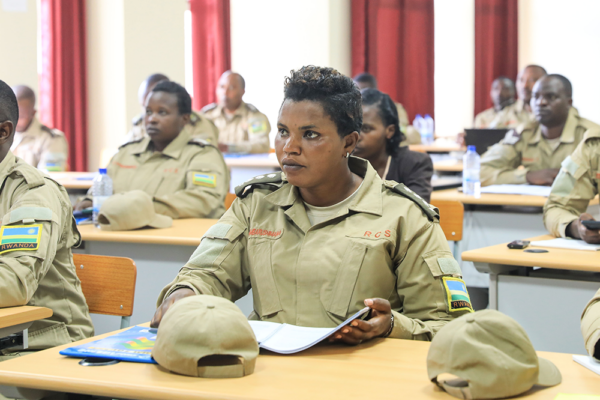
“During this training we learnt various innovative approaches to prisoner rehabilitation. I feel confident that this will enable us to effectively support inmates to become better individuals. We feel fully equipped to share the knowledge and skills with our colleagues across all correctional facilities,” said Superintendent Mbarushurishama.
During the closing ceremony of the training, Commissioner of Prisons Jean Bosco Kabanda, Ethics and Doctrine Division Manager at RCS, highlighted the importance of the training in enabling the institution to fulfill its mandate of rehabilitating inmates to become better citizens.
He also revealed that the curriculum will be integrated into RCS’s Training School courses offered to newly recruited staff and refresher courses for in-service officers.
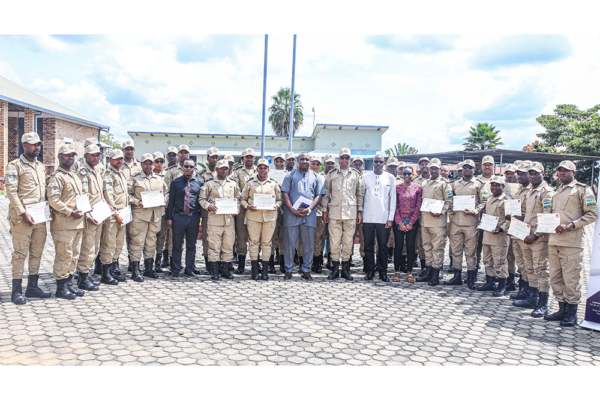
"We are all land; it's better if the land feeds us and unites us...". Christian Vangazi, Interpeace programme officer
Effective land administration plays a crucial role in preventing conflicts between communities. Properly managing land resources is instrumental in reducing disputes related to land ownership, use, and access. In the Mambasa territory of the Ituri province in the Democratic Republic of Congo (DRC), tensions regarding land frequently escalate into violent conflicts. These conflicts are often attributed to the absence of clear policies and regulations governing land administration, as well as the land registry division’s inability to effectively resolve disputes.
Interpeace launched a series of consultations and coaching sessions focused on resolving land disputes in order to prevent conflicts and foster community harmony. These training sessions were created for provincial officials and local stakeholders involved in land administration in the Ituri region. This approach is being implemented as part of the "Support to Mediation for Resilience and Peace in Ituri and the Grand North-Kivu" project funded by the European Union. The project is led by a mediation consortium consisting of Interpeace, the Pole Institute, Action for Peace and Concord, and the Centre for International Cooperation at New York University.
Through this project, Interpeace aims to mobilise all members of the land administration in resolving land disputes to restore peace and peaceful coexistence between communities. "I call on you to lend us a hand in what we are doing so that we can uproot all conflicts and misunderstandings that Mambasa is facing. We are all land, and we will return to the land," said Christian Vangazi, programme manager at Interpeace.
In late February, the consortium organised a technical support workshop for thirty local actors to address and resolve land disputes in the Mambasa territory. The two-day event brought together community leaders and other participants to discuss the intricacies of land law and the identification of disputes. The workshop culminated in the development of an action plan to mediate future disputes. In addition to the practical aspects of dispute resolution, the workshop also provided an overview of basic agricultural law and a brief introduction to the National Land Reform Commission (CONAREF). This information will prove invaluable to participants as they navigate the complex legal landscape of land disputes.
During the course of the workshop, the participants openly acknowledged that they had gained new insights and knowledge related to the land sector. One person expressed gratitude, saying, "We congratulate Interpeace for this capacity-building initiative. I am now informed of the land acquisition procedure and the history of land legislation. Thank you very much for these reminders."
The Deputy Military Administrator of the Mambasa territory encouraged participants not only to act as role models in conveying peace messages but also to popularise the legal framework established by the legislator. "We must be role models in conducting actions on the ground and be guided by the spirit of the law since we act on behalf of the Congolese State," stated the Administrator.
Participants expressed satisfaction with the capacity-building session, as it helped them distinguish between land administration and territorial planning services. They also admitted that they previously did not know who did what in land affairs.
Consultations with actors in Ituri province have been carried out since May 2022 to identify organizations working in the field of peacebuilding.























